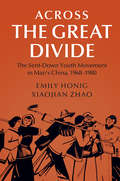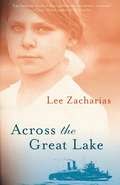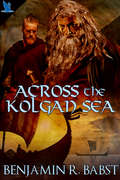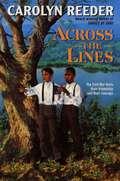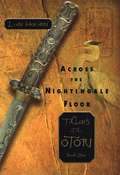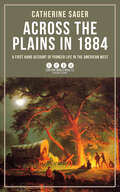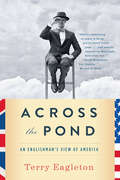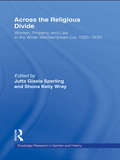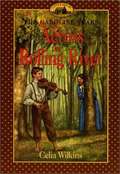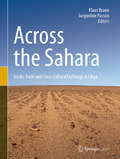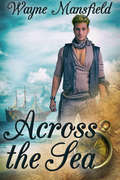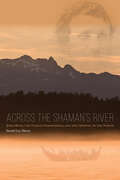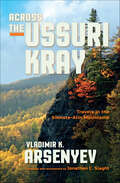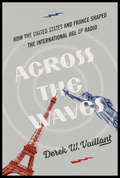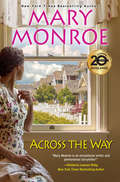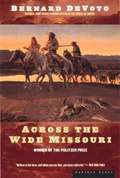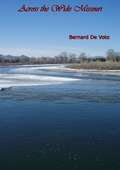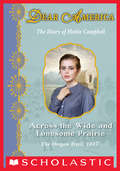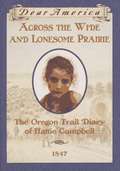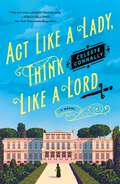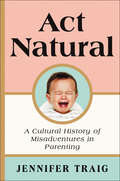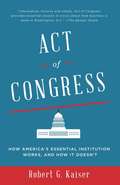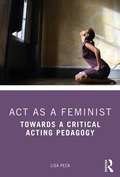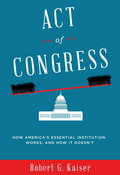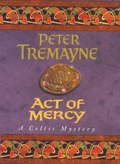- Table View
- List View
Across the Great Divide: The Sent-down Youth Movement in Mao's China, 1968–1980 (Cambridge Studies in the History of the People's Republic of China)
by Xiaojian Zhao Emily HonigThe sent-down youth movement, a Maoist project that relocated urban youth to remote rural areas for 're-education', is often viewed as a defining feature of China's Cultural Revolution and emblematic of the intense suffering and hardship of the period. Drawing on rich archival research focused on Shanghai's youth in village settlements in remote regions, this history of the movement pays particular attention to how it was informed by and affected the critical issue of urban-rural relations in the People's Republic of China. It highlights divisions, as well as connections, created by the movement, particularly the conflicts and collaborations between urban and rural officials. Instead of chronicling a story of victims of a monolithic state, Honig and Zhao show how participants in the movement - the sent-down youth, their parents, and local government officials - disregarded, circumvented, and manipulated state policy, ultimately undermining a decade-long Maoist project.
Across the Great Lake
by Lee Zacharias"It was a huge and powerful ship with a tall, handsome pilothouse and big smoking stacks, no place for a girl, though I loved it, I cannot tell you how much I loved it." In her eighty-fifth year, Fern Halvorson tells the story of a childhood journey across Lake Michigan and the secret she has kept since that ill-fated voyage. As his wife lies dying in the brutally cold winter of 1936, Henrik Halvorsen takes his daughter Fern away with him. He captains a great coal-fired vessel, the Manitou, transporting railroad cars across the icy lake. The five-year-old girl revels in the freedom of the ferry, making friends with a stowaway cat and a gentle young deckhand. The sighting of a ghost ship, though, presages danger for all aboard.
Across the Kolgan Sea
by Benjamin R. BabstThe Agrian and Shaloor are two kingdoms that have held a bitter grudge against each other for centuries. Even small disputes have led to bloody wars. So you can only imagine what happens when Erland, a young Shaloor, is found beached in Agria.He manages to escape by pure luck, leaving him with the meager task of returning home. Simple enough. Unless, of course, Erland wishes to do so without drawing the ire of the Agrians or their god. That might take a little more effort.
Across the Lines
by Carolyn ReederEdward and Simon watch the huge Yankee fleet move up the river, headed for Richmond. They stare in disbelief as some of the troop-filled vessels land and Yankee soldiers swarm onto the plantation.
Across the Nightingale Floor (Tales of the Otori #1)
by Lian HearnThis is the story of a young man whose family is massacred and who is rescued by a noble. It is also the story of a young girl who has been imprisoned in a castle simply to be held hostage for the good behavior of her family. It is a story of magic and loyalty and love. It won a number of awards for young adult fiction.
Across the Plains in 1884: A First Hand Account of Pioneer Life in the American West
by Catherine SagerEmbark on an unforgettable journey into the heart of the American West with the Sager family, pioneers who braved the infamous Oregon Trail. In the face of tragedy, Henry and Naomi Sager's seven children found themselves orphaned not once, but twice—first on the treacherous trail, and later under the care of Marcus and Narcissa Whitman, courageous missionaries in the untamed lands of what is now Washington. The gripping tale of survival unfolds through the eyes of Catherine, the eldest daughter, who penned a poignant first-hand account in 1860. Uncover the harsh realities of the plains, the challenges of a new life with the Whitmans, and the harrowing events of the infamous Whitman massacre in November 1847. Catherine's narrative, a timeless testament to the spirit of the American westward migration, stands as one of the most authentic and captivating stories of this pivotal era in our nation's history.
Across the Pond: An Englishman's View of Ameica
by Terry EagletonAn irreverent trip through American culture by a critic who "cracks jokes as easily as one would crack walnut shells" (Washington Post). Americans have long been fascinated with the oddness of the British, but the English, says literary critic Terry Eagleton, find their transatlantic neighbors just as strange. Only an alien race would admiringly refer to a colleague as "aggressive," use superlatives to describe everything from one's pet dog to one's rock collection, or speak frequently of being "empowered." Why, asks Eagleton, must we broadcast our children's school grades with bumper stickers announcing "My Child Made the Honor Roll"? Why don't we appreciate the indispensability of the teapot? And why must we remain so irritatingly optimistic, even when all signs point to failure? On his quirky journey through the language, geography, and national character of the United States, Eagleton proves to be at once an informal and utterly idiosyncratic guide to our peculiar race. He answers the questions his compatriots have always had but (being British) dare not ask, like why Americans willingly rise at the crack of dawn, even on Sundays, or why we publicly chastise cigarette smokers as if we're all spokespeople for the surgeon general. In this pithy, warmhearted, and very funny book, Eagleton melds a good old-fashioned roast with genuine admiration for his neighbors "across the pond."
Across the Religious Divide: Women, Property, and Law in the Wider Mediterranean (ca. 1300-1800) (Routledge Research in Gender and History)
by Jutta Gisela Sperling Shona Kelly WrayExamining women's property rights in different societies across the entire medieval and early modern Mediterranean, this volume introduces a unique comparative perspective to the complexities of gender relations in Muslim, Jewish, and Christian communities. Through individual case studies based on urban and rural, elite and non-elite, religious and secular communities, Across the Religious Divide presents the only nuanced history of the region that incorporates peripheral areas such as Portugal, the Aegean Islands, Dalmatia, and Albania into the central narrative. By bridging the present-day notional and cultural divide between Muslim and Judeo-Christian worlds with geographical and thematic coherence, this collection of essays by top international scholars focuses on women in courts of law and sources such as notarial records, testaments, legal commentaries, and administrative records to offer the most advanced research and illuminate real connections across boundaries of gender, religion, and culture.
Across the Rolling River (The Caroline Years #5)
by Celia WilkinsThe Little House books have captivated millions of readers with their story of Laura Ingalls, a little pioneer girl growing up on the American frontier. Now travel back to the generation before Laura's and read the story of Caroline Quiner, the little girl who would grow up to be Ma Ingalls in the beloved Little House books. <P>The little town of Concord, Wisconsin, is bustling with new settlers from the East. Caroline is now eleven years old, and she can't wait to go to the town's new school. Her days are full with classes, chores, and harvesttime. Wisconsin has its very first state fair, and Caroline becomes friends with a fiddle-playing boy from accross the river, a boy named Charles Ingalls. "Across The Rolling River is the fifth book in the Caroline Years, an ongoing series about the adventures of another girl from America's favorite pioneer family.
Across the Sahara: Tracks, Trade and Cross-Cultural Exchange in Libya
by Klaus Braun Jacqueline PassonThis open access book provides a multi-perspective approach to the caravan trade in the Sahara during the 19th century. Based on travelogues from European travelers, recently found Arab sources, historical maps and results from several expeditions, the book gives an overview of the historical periods of the caravan trade as well as detailed information about the infrastructure which was necessary to establish those trade networks. Included are a variety of unique historical and recent maps as well as remote sensing images of the important trade routes and the corresponding historic oases. To give a deeper understanding of how those trading networks work, aspects such as culturally influenced concepts of spatial orientation are discussed. The book aims to be a useful reference for the caravan trade in the Sahara, that can be recommended both to students and to specialists and researchers in the field of Geography, History and African Studies.
Across the Sea
by Wayne MansfieldTwenty-two-year-old Jacob Tomkins is sentenced to seven years’ labour in the fledgling colony of Sydney Town, Australia. The voyage across the sea is arduous. He is travelling with mean, street-hardened criminals, some of whom would like to use him for their pleasure.Fortunately he meets Peter, who takes Jacob under his wing. Together they find moments of pleasure amid the drudgery of the voyage. They share their hopes and dreams, and finally declare their love for each other upon the eve of their arrival in Sydney Town -- a place where the currency is rum, distilled and controlled by the powerful military.But what will happen once they disembark? The chances of remaining together are slim. A lot can happen in seven years, especially when Jacob’s new master takes a liking to him. Is their love strong enough to survive the ravages of time? Can they survive the rigors of their sentences?
Across the Shaman's River: John Muir, The Tlingit Stronghold, and the Opening of the North
by Daniel Lee HenryThe story of one of Alaska&’s last Indigenous strongholds, shut off for a century until a fateful encounter between a shaman, a preacher, and a naturalist.Tucked in the corner of Southeast Alaska, the Tlingits had successfully warded off the Anglo influences that had swept into other corners of the territory. This Native American tribe was viewed by European and American outsiders as the last wild tribe and a frustrating impediment to access. Missionaries and prospectors alike had widely failed to bring the Tlingit into their power. Yet, when naturalist John Muir arrived in 1879, accompanied by a fiery preacher, it only took a speech about &“brotherhood&”—and some encouragement from the revered local shaman Skandoo&’o—to finally transform these &“hostile heathens.&”Using Muir&’s original journal entries, as well as historic writings of explorers juxtaposed with insights from contemporary tribal descendants, Across the Shaman&’s River reveals how Muir&’s famous canoe journey changed the course of history and had profound consequences on the region&’s Native Americans.&“The product of three decades of thought, research, and attentive listening. . . . Henry shines a bright light on events that have long been shadowy, half-known. . . . Now, thanks to careful scholarship and his access to Tlingit oral history, we are given a different perspective on familiar events: we are inside the Tlingit world, looking out at the changes happening all around them.&” —Alaska History
Across the Ussuri Kray: Travels in the Sikhote-Alin Mountains
by Vladimir K. ArsenyevIn Russia's Far East sits the wild Ussuri Kray, a region known for its remote highlands and rugged mountain passes where tigers and bears roam the cliffs, and salmon and lenok navigate the rivers. In this collection of travel writing by famed Russian explorer and naturalist Vladimir K. Arsenyev (1872-1930), readers are shuttled back to the turn of the 20th century when the Russian Empire was reeling from its defeat in the Russo-Japanese War (1904-1905) and vulnerable to its Far Eastern neighbors. What began as an expedition to survey the region's infrastructure for the Russian military turned into an adventure through a territory rich in ethnic and ecological diversity. Encountering the disappearing indigenous cultures of the Nanai and Udege, engaging the help of Korean farmers and Chinese hunters, and witnessing the beginning of indomitable Russian settlement, Arsenyev documents the lives and customs of the region's inhabitants and their surroundings. Originally written as "a popular scientific description of the Kray," this unabridged edition includes photographs largely unseen for nearly a century and is annotated by Jonathan C. Slaght, a biologist working in the same forests Arsenyev explored. Across the Ussuri Kray is a classic of northeast Asian cultural and natural history.
Across the Waves: How the United States and France Shaped the International Age of Radio
by Derek W VaillantIn 1931, the United States and France embarked on a broadcasting partnership built around radio. Over time, the transatlantic sonic alliance came to personify and to shape American-French relations in an era of increased global media production and distribution. Drawing on a broad range of American and French archives, Derek Vaillant joins textual and aural materials with original data analytics and maps to illuminate U.S.-French broadcasting's political and cultural development. Vaillant focuses on the period from 1931 until France dismantled its state media system in 1974. His analysis examines mobile actors, circulating programs, and shifting governmental and other institutions shaping international radio's use in times of war and peace. He explores the extraordinary achievements, the miscommunications and failures, and the limits of cooperation between America and France as they shaped a new media environment. Throughout, Vaillant explains how radio's power as an instantaneous mass communications tool produced, legitimized, and circulated various notions of states, cultures, ideologies, and peoples as superior or inferior.
Across the Way (The Neighbors Series #3)
by Mary MonroeIn this captivating Depression-era set novel by New York Times bestselling author Mary Monroe, two couples find their grudges endangering more than their Alabama small town&’s deceptive peace . . . When good-time couple Milton and Yvonne Hamilton moved one house over from the respectable-but-restless Odell and Joyce Watson, it was a fast friendship of shared secrets—and secret jealousies and betrayals. Their alliance was bound to crash and burn, but the Hamiltons won&’t quite let the flame die out, even after scandalous accusations get them arrested . . . Odell would do anything to be free of his bootlegging, blackmailing, money extorting neighbors and recover the peaceful—and financially prosperous—life he and Joyce once had. But Milton and Yvonne seem to always bounce back from bad luck, and this time they&’ve returned angrier, and greedier, than ever. Determined to get what Odell &“owes&” them, the Hamiltons have a big surprise for Joyce too, one that shows how far they will go to get revenge . . . Now pushed past his breaking point, Odell is sure he&’s got a foolproof plan to end the scheming once and for all. But it soon spirals into lies, shattering violence, and permanent damage that will roil their tranquil community, and alter his and Joyce&’s world forever . . .
Across the Wide Missouri
by Bernard A. DevotoAcross the Wide Missouri tells the compelling story of the climax and decline of the Rocky Mountain fur trade during the 1830s. More than a history, it portrays the mountain fur trade as a way of business and a way of life, vividly illustrating how it shaped the expansion of the American West.<P><P> Winner of the Pulitzer Prize and the Bancroft Prize.
Across the Wide Missouri
by Bernard De Voto Mae Reed Porter“Winner of the Pulitzer Prize and the Bancroft Prize, ACROSS THE WIDE MISSOURI tells the compelling story of the climax and decline of the Rocky Mountain fur trade during the 1830s. More than a history, it portrays the mountain fur trade as a way of business and a way of life, vividly illustrating how it shaped the expansion of the American West.Bernard de Voto (1897 – 1955) winner of the Pulitzer prize and the National Book Award, was a renowned scholar-historian of the American West and one of our century’s greatest men of letters.“One of the literary lions of his day.”-Stephen E. Ambrose” —Print ed.
Across the Wide and Lonesome Prairie: The Oregon Trail Diary Of Hattie Campbell (Dear America)
by Kristiana GregoryCritically acclaimed and award-winning author Kristiana Gregory's ACROSS THE WIDE AND LONESOME PRAIRIE is now back in print with a gorgeous new package!After the death of her two sisters, thirteen-year-old Hattie and her family make for a fresh start. They sell their farm in Missouri and journey across the Oregon Trail toward Oregon City. At first the adventure is exciting, but as the days, weeks, and months pass, Hattie realizes what a dangerous and tedious trip it is. As they cross the prairies, news of the fate of the Donner party reaches them, and death, disease, weather, and the terrain take a terrible toll on their traveling party. The Campbells lose neighbors and friends until they almost cannot bear to continue. But Hattie and her family must persevere or risk the same misfortune. Hattie's diary chronicles the hardships of such a harrowing journey, but also captures the small moments, the friendships and celebrations of life, that keep hope alive.
Across the Wide and Lonesome Prairie: The Oregon Trail Diary of Hattie Campbell
by Kristiana GregoryIn her diary, 13-year-old Hattie chronicles her family's arduous 1847 journey from Missouri to Oregon, along the Oregon Trail. Historical fiction.
Act Like a Lady, Think Like a Lord: A Mystery (Lady Petra Inquires #1)
by Celeste ConnallyBridgerton meets Agatha Christie in Act Like a Lady, Think Like a Lord, a dazzling first entry in a captivating new Regency-era mystery series with a feminist spin from Celeste Connally.London, 1815. Lady Petra Forsyth, daughter of the Earl of Holbrook, has made a shocking proclamation. After losing her beloved fiancé in an accident three years earlier, she announces in front of London’s loosest lips that she will never marry. A woman of independent means—and rather independent ways—Petra sees no reason to cede her wealth and freedom to any man now that the love of her life is gone. Instead, she plans to continue enjoying the best of society without any expectations.But when ballroom gossip suggests that a longtime friend has died of a fit due to her “melancholia” while in the care of a questionable physician, Petra vows to use her status to dig deeper. Just as Petra has reason to believe her friend is alive, a shocking murder proves more danger is afoot than she thought. And the more determined Lady Petra becomes in uncovering the truth, the more her own headstrong actions and desire for independence are used against her, putting her own freedom—and possibly her life—in jeopardy.
Act Natural: A Cultural History of Misadventures in Parenting
by Jennifer TraigFrom a distinctive, inimitable voice, a wickedly funny and fascinating romp through the strange and often contradictory history of Western parentingWhy do we read our kids fairy tales about homicidal stepparents? How did helicopter parenting develop if it used to be perfectly socially acceptable to abandon your children? Why do we encourage our babies to crawl if crawling won’t help them learn to walk?These are just some of the questions that came to Jennifer Traig when—exhausted, frazzled, and at sea after the birth of her two children—she began to interrogate the traditional parenting advice she’d been conditioned to accept at face value. The result is Act Natural, hilarious and deft dissection of the history of Western parenting, written with the signature biting wit and deep insights Traig has become known for. Moving from ancient Rome to Puritan New England to the Dr. Spock craze of mid-century America, Traig cheerfully explores historic and present-day parenting techniques ranging from the misguided, to the nonsensical, to the truly horrifying. Be it childbirth, breastfeeding, or the ways in which we teach children how to sleep, walk, eat, and talk, she leaves no stone unturned in her quest for answers: Have our techniques actually evolved into something better? Or are we still just scrambling in the dark?
Act Of Congress: How America's Essential Institution Works, And How It Doesn't
by Robert KaiserAn eye-opening account of how Congress today really works—and how it doesn’t— Act of Congress focuses on two of the major players behind the sweeping financial reform bill enacted in response to the Great Crash of 2008: colorful, wisecracking congressman Barney Frank, and careful, insightful senator Christopher Dodd, both of whom met regularly with Robert G. Kaiser during the eighteen months they worked on the bill. In this compelling narrative, Kaiser shows how staffers play a critical role, drafting the legislation and often making the crucial deals. Kaiser’s rare insider access enabled him to illuminate the often-hidden intricacies of legislative enterprise and shows us the workings of Congress in all of its complexity, a clearer picture than any we have had of how Congress works best—or sometimes doesn’t work at all.
Act as a Feminist: Towards a Critical Acting Pedagogy
by Lisa PeckAct as a Feminist maps a female genealogy of UK actor training practices from 1970 to 2020 as an alternative to traditional male lineages. It re-orientates thinking about acting through its intersections with feminisms and positions it as a critical pedagogy, fit for purpose in the twenty-first century. The book draws attention to the pioneering contributions women have made to actor training, highlights the importance of recognising the political potential of acting, and problematises the inequities for a female majority inspired to work in an industry where they remain a minority. Part One opens up the epistemic scope, shaping a methodology to evaluate the critical potential of pedagogic practice. It argues that feminist approaches offer an alternative affirmative position for training, a via positiva and a way to re-make mimesis. In Part Two, the methodology is applied to the work of UK women practitioners through analysis of the pedagogic exchange in training grounds. Each chapter focuses on how the broad curriculum of acting intersects with gender as technique to produce a hidden curriculum, with case studies on Jane Boston and Nadine George (voice), Niamh Dowling and Vanessa Ewan (movement), Alison Hodge and Kristine Landon-Smith (acting), and Katie Mitchell and Emma Rice (directing). The book concludes with a feminist manifesto for change in acting. Written for students, actors, directors, teachers of acting, voice, and movement, and anyone with an interest in feminisms and critical pedagogies, Act as a Feminist offers new ways of thinking and approaches to practice.
Act of Congress: How America's Essential Institution Works, and How It Doesn't
by Robert G. KaiserAn eye-opening account of how Congress today really works--and doesn't--that follows the dramatic journey of the sweeping financial reform bill enacted in response to the Great Crash of 2008.The founding fathers expected Congress to be the most important branch of government and gave it the most power. When Congress is broken--as its justifiably dismal approval ratings suggest--so is our democracy. Here, Robert G. Kaiser, whose long and distinguished career at The Washington Post has made him as keen and knowledgeable an observer of Congress as we have, takes us behind the sound bites to expose the protocols, players, and politics of the House and Senate--revealing both the triumphs of the system and (more often) its fundamental flaws. Act of Congress tells the story of the Dodd-Frank Act, named for the two men who made it possible: Congressman Barney Frank, brilliant and sometimes abrasive, who mastered the details of financial reform, and Senator Chris Dodd, who worked patiently for months to fulfill his vision of a Senate that could still work on a bipartisan basis. Both Frank and Dodd collaborated with Kaiser throughout their legislative efforts and allowed their staffs to share every step of the drafting and deal making that produced the 1,500-page law that transformed America's financial sector. Kaiser explains how lobbying affects a bill--or fails to. We follow staff members more influential than most senators and congressmen. We see how Congress members protect their own turf, often without regard for what might best serve the country--more eager to court television cameras than legislate on complicated issues about which many of them remain ignorant. Kaiser shows how ferocious partisanship regularly overwhelms all other considerations, though occasionally individual integrity prevails. Act of Congress, as entertaining as it is enlightening, is an indispensable guide to a vital piece of our political system desperately in need of reform.
Act of Mercy (Sister Fidelma Mysteries Book 8): A page-turning Celtic mystery filled with chilling twists
by Peter TremayneSuper sleuth Sister Fidelma returns in the eighth historical mystery by Peter Tremayne, acclaimed author of THE MONK WHO VANISHED, VALLEY OF THE SHADOW and many more.PRAISE FOR ACT OF MERCY: 'Wonderfully evocative' The Times When Sister Fidelma sets out on a pilgrimage in the autumn of AD 666, her main preoccupation is to reflect on her commitment to the religious life and her relationship with the Saxon monk, Eadulf, whom she has left behind. Complications arise during the first night on the ship when one of the pilgrims is apparently washed overboard. The discovery of a blood-stained robe raises the question of murder and Fidelma finds herself having to focus all her abilities on solving the mystery. Death dogs the tiny band of pilgrims in the close confines of the ship, but is not until the Holy Shrine is almost reached that the amazing truth is uncovered... What readers are saying about ACT OF MERCY:'I never tire of reading about the escapades of this very self-opinionated young woman and her interactions with some very strange characters! Another great read!''So many twists I could not put it down! Pilgrims and pirates - Fidelma has trouble finding the truth''An intriguing glimpse of Fidelma's interior life and past'
